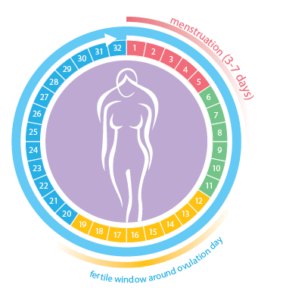You can save precious months of waiting if you’re trying to get pregnant, by using fertility awareness methods (FAM) instead of pure chance. You may be thinking: “Of course, natural methods are ineffective in preventing pregnancy! Everybody knows that!” That’s not it at all. In fact FAMs are very effective in preventing pregnancy when that’s the goal. But the same science helps couples know more about the right timing, and can increase their chance of conceiving.
Jackie and Miguel have 4 children. Each of them were not only conceived quickly, but at a time that worked best for their parents. “I wanted my children spaced two years apart: that’s what we did, to the month”, said Jackie. Contrast that with future parents who were on the pill: it’s not rare that they have to wait for months, especially if they are older. It’s even more critical since people get married later in life[i]. At 30, your fertility starts to decrease, making conception harder. The natural monthly fecundity rate between the ages of 20 and 30 is about 25% but decreases to below 10% above the age of 35[ii].
A number of factors can affect the time to pregnancy and estimating the average time to pregnancy is not a simple matter. A study that tracked conception among couples who used the symptom-thermal method, a popular form of FAMs, showed that 78% achieved in three months, and 81% in six months[iii]. Among the general population, not using any method, 59% will get pregnant in three cycles, 80% in six cycles, and 85% will get pregnant within a 12-month period.
More importantly, here is the science that explains why using a FAM to conceive can make a difference:
- A woman only ovulates one time per cycle. Sometimes she produces two eggs, but it will be within the same 24 hours. The egg only lives for 12-24 hours.
- However, in the right conditions, the sperm lives up to five days in the woman’s body, and an egg can be fertilized up to 24 hours after ovulation. So the window of time during which one can achieve pregnancy if they have intercourse is about 6 days per cycle.
- For the sperm to survive five days and not die within an hour of getting into the vagina, there must be fertile cervical fluid. It’s a fluid produced by the woman’s cervix that will protect and nourish the sperm and allow it to travel all the way to the egg. Without it, sperm doesn’t have a chance, and conception will likely never happen.
- As a result of this combination (sperm that lives up to five days thanks to cervical fluid, and then eggs that show up and live up to 24 hours), science shows that a woman is only fertile three to six days per cycle. The highest probability of pregnancy (25-28%) is statistically when women have intercourse during the 1-2 days before ovulation.
You can understand now why knowing when you are about to ovulate and when ovulation actually happened is critical. And that’s where FAMs come to play. A FAM will teach you to read your biomarkers (like the cervical fluid, your temperature, or hormone levels) with simple physical observations every day. That way you will know when the fertile window starts and you can plan intercourse accordingly to increase your chance of success.

Warning: you may read in popular media that most women ovulate on the 14th or the 15th day after their period begins, which implies that they have a regular cycle. The reality is that only 10% of women have a 28-day cycle, and cycles ranging from 21 to 35 days are considered normal. Ovulation can be delayed for a number of reasons, and that’s why this advice can cause delay in getting pregnant. The actual charting of your biomarkers is much more effective. Happily, we’re starting to see the same media suggesting the use of a FAM to get pregnant faster.
Note also that being on the pill prior to trying to achieve a pregnancy can seriously affect the production of fertile cervical fluid, making it harder for women to get pregnant right away (see what we wrote about it here). If you have the intention to have children, especially if you are past 30 years old, you may seriously consider staying off the pill, and learning a FAM. It will be an effective way to postpone pregnancy and will help you get pregnant when you are ready. If you’ve been on the pill, you may want to get off and give time to your body to recover its natural pace and production of fertile fluid, which could take a few months.
If you are using one of these methods correctly (we encourage you to learn from a teacher) and you’re still experiencing difficulties getting pregnant or keeping a pregnancy, check out our Infertility content, where you’ll find articles that explain other effective causes and solutions, even before you start working with a fertility specialist.
When this article refers to fertility awareness methods (FAM), or natural family planning (NFP), we are referring to Fertility Awareness-Based Methods, evidence-based methods of cycle charting which can be used as effective forms of natural birth control when learned by a certified instructor.
References
[i] Woman are waiting longer to start their families now that in the past. In 1970, most women had their first pregnancy in their early 20s. The average age of first child birth was 22. Today, it has risen to 26.4 years old. More women are delaying their first pregnancy past age 30. The percentage of first birth to women over 30 went from just one in ten in 1970 to almost one in three in 2014. Source: First Births to Older Women Continue to Rise , NCHS Data Brief No. 152, May 2014 by T.J. Mathews, M.S.; and Brady E. Hamilton, Ph.D. https://www.cdc.gov/nchs/products/databriefs/db152.htm
[ii] J Hum Reprod Sci. 2010 Sep-Dec; 3(3): 121–123. doi: 10.4103/0974-1208.74152 Fertility and age. Korula George and Mohan S Kamath
[iii] Gnoth C, Godehardt D, Godehardt E. Time to pregnancy; results of the German prospective study and impact on the management of infertility. Hum Reproduction 18(9):1959-1966, 2003








After consulting many doctors I thought getting pregnant wasn’t gonna be easy for me due to my health condition, few months after I read one testimony of a spell caster specialist, I mailed him and I followed the methods which he explained. Within few weeks I got pregnant naturally without any medicine. I recommend to all persons looking for natural pregnancy to give it a try. You will get the same result here >> drphilipspelltemple@gmail. com
It is so sad that infertility is still such taboo subject that “awareness” week is not even really a thing. But I am “out” with all my friends and family so I try and do my best to educate and be open whenever I can. Being infertile myself, I like nobody else can tell how difficult it may be. I thought making babies was going to be an easy process. It took me 4 years to get pregnant – and I was pretty sure it wasn’t going to happen. I’ve always felt terrible for people who can’t have children of their own because their eggs aren’t viable. I have no idea if I’m fertile myself. I went through 2 cycles of IVF in Biotexcom clinic. They offered an ‘all inclusive’ package that we were very happy with, as we were only focused on winning. And it is much cheaper than somewhere else and we were surprised with conditions and attitude to us. In addition cost of such procedures is much less than anywhere else and 100% guarantee of positive result. I realize that everybody couldn’t be satisfied and can fins pros and cons. Thinking of everyone who is struggling today, remember stay strong and you are awesome <3